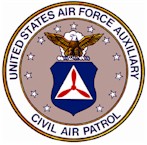Safety
Florida Wing Commander Matt Sharkey has
made it known that his not so secret agenda for Florida Wing during his
tenure is safety. This was demonstrated by his declaring a safety
week, which included a safety down day for all corporate aircraft and
vehicles. This was a great opportunity for commanders and safety
officers, at all levels, to take a fresh look at their safety programs and
identify strategies to improve upon them.
One strategy to improve our Wing’s safety program is to train,
test and certify for 101 cards, for the position of Mission Safety
Officer. The new emergency services regulations utilizing the
Incident Command System structure provides guidelines for this training,
demonstration, and certification for this position. The initial training
for this 101 specialty will be conducted during the Wing Conference in
May. The classroom training will be followed by a safety skill
demonstration to be held in the field at a later time and place to be
determined. Plan to attend!
Of the reportable aircraft incidents and accidents in 2001 only
one reported injuries associated with the incident. This statistic
indicates that the severity of incidents is not high in cost regarding
lost time or injury. It does not indicate the severity in the terms of
dollar cost to repair aircraft damage. That was significant by any
standard. Remember, statistically, most aircraft incidents and accidents
can be attributed to pilot or ground handling error.
Checklists, when used properly, can make the difference between
a successful flight and one that ends other than as planned. All pilots
are trained to use checklists prior to start up, in flight, in landing
preparation, and after landing up to and including engine shut down. Most
of us know someone, or at the very least, have heard stories of what
happens when checklists are ignored
or have been done from memory. If one item on a memorized checklist is
ignored or forgotten once, it will be forgotten the next time. The second
or third time it is forgotten may be the time that it positively had to be
checked. Checklists are meant to be used at all stages of a safe
flight. Relying on memory is an accident waiting to happen. If you are
not using printed or written checklists, do so the next time you fly and
see if you have been neglecting something that if not checked could result
in a less than happy flight.
In Civil Air Patrol we have developed checklists to be utilized
by ground teams prior to dispatch. Are your ground teams using them?
Every time? Most ground team vehicles used in CAP ground searches are
member owned and operated. The tendency is to jump in the vehicle and
head out to the assigned area without a thought about the condition and
overall safety of the vehicle. Again, an accident waiting to happen. Of
course, it’s a good idea to do a ‘go-around’ of your vehicle regularly
whether on a CAP mission or not. Cadets are often part of a ground team
and we must ensure the safety of our young people as well as of
ourselves.
Florida Wing is dedicated to developing an awareness of safety
in every aspect of our operations, including flight, ground and unit
meeting facilities and grounds. If your unit does not have a safety
officer appoint one immediately. You’ll be better for it.



